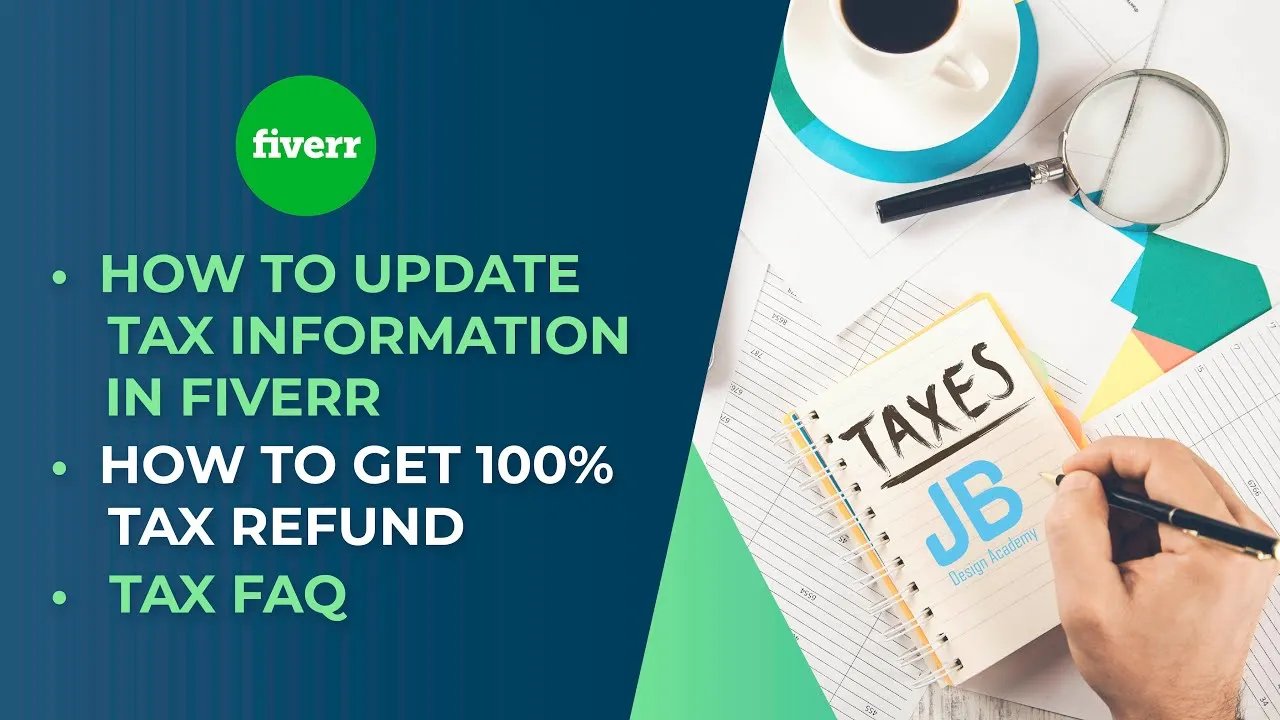When working as a freelancer or gig worker on platforms like Fiverr, it's essential to understand how taxes work. You might be wondering, "Does Fiverr automatically do taxes for me?" This is a common question among new users and can greatly impact your earnings. In this post, we'll dive into Fiverr's role when it comes to taxation, providing you with the information you need to stay compliant and maximize your income.
Understanding Fiverr's Role in Taxation

Fiverr is primarily a marketplace that connects freelancers with clients seeking various services, ranging from graphic design to writing content. However, when it comes to handling taxes, it's important to grasp what Fiverr does and what it doesn't do.
First off, Fiverr acts as a payment processor. They handle transactions between you and your clients, but they don't automatically deduct taxes from your earnings. So, what does that mean for you as a freelancer? Here are a few key points to consider:
- Independent Contractor Status: As a Fiverr seller, you are classified as an independent contractor, meaning you’re responsible for your own taxes. Fiverr doesn't withhold tax from your payments.
- Tax Forms: Fiverr does provide a tax form called the 1099-K. If you earn over $20,000 and have more than 200 transactions in a calendar year, you will receive this document. But don’t worry if you earn less; you'll still get a summary at the end of the year.
- Local Taxes: Depending on where you live, you may need to collect sales tax and report it on your return. Fiverr won't do this for you, so you'll want to check local regulations.
In summary, Fiverr provides a platform that facilitates earnings for freelancers but does not take on the responsibility of handling taxes. It’s essential for you to set aside funds for taxes and keep accurate records throughout the year to make your tax preparation a breeze!
Also Read This: What You Can Earn as a Freelance Bookkeeper
Are Fiverr Sellers Considered Independent Contractors?

Absolutely, Fiverr sellers are generally classified as independent contractors. This means that when you offer your skills and services on Fiverr, you’re essentially running your own little business. Let’s break down what being an independent contractor really entails:
- Control Over Work: As a seller, you have the freedom to set your schedule, choose the type of work you want to take on, and determine how to fulfill your client's requirements.
- No Employee Benefits: Unlike traditional employees, independent contractors do not receive benefits such as health insurance, retirement contributions, or paid time off.
- Self-Employment Tax: Independent contractors are responsible for their own taxes. This means you’ll pay both the employee and employer portions of Social Security and Medicare taxes.
This classification offers flexibility and the potential for greater earnings, but it also comes with some responsibilities. For instance, as an independent contractor, you’ll need to manage your own expenses, maintain your own business records, and set aside money for taxes. It’s essential to understand that your earnings from Fiverr will not have taxes withheld, which is a key difference from being a traditional employee.
Overall, being an independent contractor with Fiverr allows for creative freedom, but also requires a proactive approach to managing your finances.
Also Read This: How to Edit Your Portfolio on Fiverr: A Step-by-Step Guide
Tax Responsibilities for Fiverr Sellers
As a Fiverr seller, understanding your tax responsibilities can feel a bit overwhelming, but it’s crucial for your financial health. Here’s what you need to know about handling taxes when you’re working as an independent contractor:
- Track Your Earnings: Keep detailed records of all your income from Fiverr. This will include not just the gig payments, but also tips and any additional income streams you might have.
- Separate Business Expenses: As someone running a business, you can deduct various expenses related to your work. These may include:
- Software subscriptions
- Marketing costs
- Home office expenses
- Estimated Taxes: Since taxes are not withheld from your Fiverr payments, you’ll likely need to make estimated tax payments throughout the year. This can help avoid a hefty tax bill when you file your returns.
- Self-Employment Tax: In addition to income tax, you’ll also be responsible for self-employment tax, which covers Social Security and Medicare contributions.
- File Your Taxes: When tax season rolls around, you’ll need to file a Schedule C (Profit or Loss from Business) to report your income and expenses, along with your normal tax return.
In conclusion, while Fiverr offers great opportunities for independent work, understanding your tax responsibilities is equally important. By keeping accurate records and being proactive about your tax payments, you can ensure compliance and keep your hard-earned money in your pocket!
Also Read This: What is Fiverr Business?
Does Fiverr Provide Tax Documentation?
When tax season rolls around, many Fiverr sellers start to wonder about the paperwork they need to file. So, a common question emerges—does Fiverr provide tax documentation? The answer is yes! Fiverr offers essential tax forms that can help you track your earnings and properly report them to the IRS.
Each year, Fiverr issues a Form 1099-K to sellers who meet certain income thresholds. Here's a quick breakdown:
- Form 1099-K: This form is provided to US-based sellers who earn over $20,000 and have more than 200 transactions in a calendar year. This form shows the total gross payment amounts you received through the platform.
Keep in mind that even if you do not meet these thresholds, you are still responsible for reporting your earnings. Fiverr may not provide a 1099-K for smaller amounts, but it’s good practice to keep your own records for accurate reporting.
To ensure you receive these documents, always keep your profile updated with your correct information. After the tax forms are generated, you can typically access them through the “Tax documents” section in your Fiverr account. This provides a handy means to streamline your tax preparation process.
So, while Fiverr does offer documentation to help you with your taxes, don't forget that it’s ultimately your responsibility to keep track of your earnings and file your taxes accurately!
Also Read This: The Easiest Way to Find the Best Gig Title for Fiverr Success
How to Prepare for Tax Season as a Fiverr Seller
Preparing for tax season as a Fiverr seller doesn’t have to be a daunting task. With a little organization and planning, you can ensure you’re ready come tax time. Here’s how you can get started:
- 1. Keep Accurate Records: Track every transaction, including earnings and expenses. Consider using accounting software or a simple spreadsheet to record your income from each gig.
- 2. Know Your Deductions: Get familiar with what counts as a deductible business expense. This can include anything from software subscriptions, marketing costs, and even a portion of your home office setup.
- 3. Set Aside Money for Taxes: A good rule of thumb is to set aside around 25-30% of your earnings for tax payments. This can prevent scrambling for cash when tax season arrives.
- 4. Review Fiverr’s Tax Information: Check out Fiverr’s Seller Help Center for updates or clarifications on tax-related questions. They often provide valuable information tailored for freelancers.
- 5. Consult a Tax Professional: If your financial situation is complex, consider hiring a tax professional. They can provide personalized guidance, ensuring you maximize deductions and adhere to tax laws.
By following these steps, you can approach tax season with confidence. Just remember, being proactive and organized will go a long way in making the process much smoother! And who knows, you might even discover new insights about your freelancing business along the way.
Does Fiverr Automatically Do Taxes?
When it comes to freelancing platforms like Fiverr, many users wonder if tax management is handled automatically by the platform. Understanding Fiverr's role in tax processes is crucial for freelancers and service providers using the site. Here’s a detailed exploration of how Fiverr addresses tax obligations.
1. Fiverr's Tax Responsibilities:
Fiverr acts primarily as a facilitator for transactions between buyers and sellers. While Fiverr itself collects service fees from the freelancers, it does not withhold taxes from payments made to sellers. Here are some key points about Fiverr’s tax responsibilities:
- Fiverr provides users with a year-end tax document known as the 1099-K form (for U.S. users) if they meet the minimum threshold of earnings.
- Freelancers are responsible for reporting their own income and paying any required taxes on that income.
- International users may receive different forms, like a 1042-S, depending on their earnings and tax status.
2. Freelancer's Responsibilities:
Freelancers utilizing Fiverr must keep track of their income and expenses to ensure they meet tax obligations. Here are some responsibilities:
- Maintain accurate records of sales and expenses related to freelance work.
- Consult with tax professionals to determine the appropriate tax filings based on individual circumstances.
- Make estimated quarterly tax payments if necessary, especially for self-employment taxes.
In conclusion, while Fiverr provides necessary tax documents for U.S. freelancers, it does not automatically handle or calculate taxes for its users. Therefore, it is essential for freelancers to actively manage their own tax obligations to remain compliant with tax laws.



